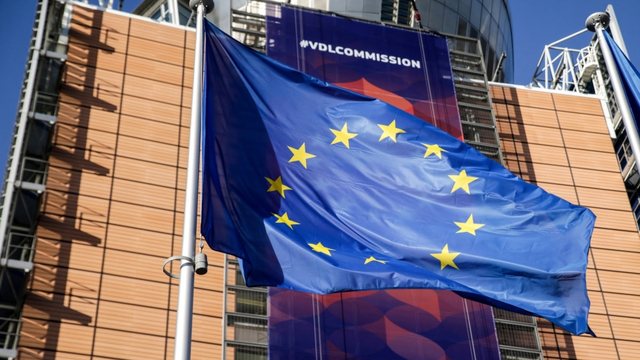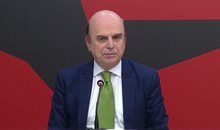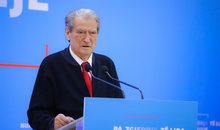
 Flash News
Flash News
HIV on the rise in Kosovo, 10 new cases recorded in five months
AMP checks at Kapshtica customs, drug found hidden in a vehicle
Insult and denigration, the Journalists Association of Albania condemns Ristan's attack on the "Piranha" journalist
"Land Rover" abandoned for two years in the Port of Durres, 3 firearms and cartridges found, 24-year-old wanted
Mavraj's message to the Rossoneri: Kosovo is ours forever. Now play football
The new composition of the European Commission is confirmed, the mandate starts on December 1

The European Parliament with a majority of votes has confirmed on Wednesday the new composition of the European Commission, which in the next five years will again be led by Ursula von der Leyen.
For the new composition of the European Commission, 370 deputies voted for, 282 were against, while 38 abstained.
Before the vote in the plenary session, a debate took place, in which Ursula von der Leyen once again presented the composition of the Commission in her second term as president of the EU executive.
During the speech, Von der Leyen promised that the Commission will commit to a stronger, more secure Europe, which will increase investment in defense and continue working towards reducing ambient pollution levels, as well as digitization and growth of the competitiveness of the European economy on the global stage.
The European Parliament had set the vote for this plenary session after agreement was reached between the main political groups for the confirmation of all 26 proposed commissioners, while Von der Leyen was confirmed during the summer.
All commissioners previously went through hearings in the relevant EP committees and each of them has received the support to exercise the position of commissioner in the field assigned to them. For the first time after 25 years, no candidate for member of the European Commission was rejected by the committees of the European Parliament.
Disagreements had been overcome between the three pro-European groups, the European People's Party (EPP) which is the largest group, the Socialists and Democrats (S&D) which is the second largest group and the Liberals group, which has declined and is the fifth group. in terms of the total number of deputies.
Together, these three groups had a sufficient majority to vote for the new European Commission in the plenary session. But, despite this, there were MPs from these groups who voted against the confirmation of the European Commission. Those votes were then compensated by votes from several other political groups such as the Greens, but also some from the ranks of extreme right-wing groups.
The next commissioner for enlargement, Marta Kos, from Slovenia, and the high representative for foreign policy and security, Kaja Kallas, are expected to deal mostly with the Western Balkans region in the next five years. Both of them, during the hearings, have promised that they will commit to making the expansion of the European Union a reality in the next five years.
Ursula von der Leyen in her speech said that the candidate countries, such as those from the Western Balkans, as well as Ukraine, Moldova and Georgia, have their place in the EU. The head of the European Commission reiterated that she expects the commissioner for enlargement, Marta Kos, to work to prepare the EU for enlargement and to help the candidate countries to advance in the European integration process.
Von der Leyen said that the enlargement process will continue respecting the principle of individual merits of the candidate countries in the reform process.
The new composition of the European Commission has 14 members from the European People's Party (EPP), which is also the largest political group in the European Parliament. While the liberals will have 5 members in the European Commission, even though they have recorded a big drop in the last European elections, coming to the fifth position in terms of the number of deputies in the EP.
Socialists and Democrats, who remain the second largest group in the European Parliament, this time will have only 4 members in the European Commission.
Two commissioners come from the ranks of far-right parties, while one, Marosh Šefčović from Slovakia, does not belong to any grouping since the party of the Slovak prime minister has been excluded from the grouping of Socialists and Democrats due to disagreements in attitudes towards Russia and cooperation with the right. extreme.
The confirmation of the new composition of the European Commission in Wednesday's plenary session has opened the possibility for the new five-year mandate to start on Sunday, December 1. This mandate will last until the fall of 2029. On that same day, December 1, the mandate of the new president of the European Council, Antonio Costa, will begin./ REL
Latest news




Trump warns of 'consequences' if Musk funds political rivals
2025-06-07 21:29:11


14-year-old falls from 6th floor of apartment in Tirana
2025-06-07 20:28:07
"Old enemies don't make new friends"
2025-06-07 19:52:58




HIV on the rise in Kosovo, 10 new cases recorded in five months
2025-06-07 17:47:59
Fire in the waste field in Vlora, Berisha: Monstrous crime against citizens
2025-06-07 17:27:40

PL: The country's food safety system does not track food contamination
2025-06-07 16:40:37
Fire engulfs Vlora waste field again, mayor: Intentional
2025-06-07 16:20:06
20-year-old man ends his life in Pogradec, police reveal details
2025-06-07 15:47:29
Tourism without heritage: Durrës opens the season with museums closed
2025-06-07 15:27:30

Gjendet një person i pajetë në Tiranë
2025-06-07 14:54:23
Detailed control, the rules that fans must follow in the Albania-Serbia match
2025-06-07 14:32:19
A heat wave will sweep across Albania next week
2025-06-07 14:10:18





AMP checks at Kapshtica customs, drug found hidden in a vehicle
2025-06-07 12:15:26
Kosovo Assembly fails to be constituted even after 28 attempts
2025-06-07 11:58:58


Oh Albania, you have no old age!
2025-06-07 11:05:01


Mavraj's message to the Rossoneri: Kosovo is ours forever. Now play football
2025-06-07 10:10:52


Why are Ukrainians being accused of arson at Keir Starmer's properties?
2025-06-07 09:16:24
Foreign exchange, how much foreign currencies are sold and bought today
2025-06-07 09:04:55

Horoscope, what do the stars have in store for you today?
2025-06-07 08:31:29
Weather forecast for Saturday, here's what the temperatures will be like
2025-06-07 08:17:35
Posta e mëngjesit/ Me 2 rreshta: Çfarë pati rëndësi dje në Shqipëri
2025-06-07 08:01:23
Heavy metals in the Drin River, causes of cancerous diseases
2025-06-06 22:54:02


Works in Spaç, Lubonja: Destruction of collective and historical memory
2025-06-06 21:54:32

DASH: Balkans, part of American strategy for expelling migrants
2025-06-06 21:12:33

Ilir Shqina, a diplomat, and her business partner Grida Dumas were suddenly born
2025-06-06 20:21:46


Couple injured in Kavaja, police find firearm hidden in wall
2025-06-06 19:05:19

EULEX mandate in Kosovo extended until 2027
2025-06-06 17:58:20
These are the 3 zodiac signs that will be favored in the next decade
2025-06-06 17:50:52


Anthropology
2025-06-06 17:06:00
EU supports International Criminal Court after US sanctions
2025-06-06 16:47:51
Gonxhe ignores concerns about Spaçi and defends the continuation of the works
2025-06-06 16:31:42
Providing online services, report: Institutions, delays in update requests
2025-06-06 16:24:10

The head of the Vlora Cadastre is changed again
2025-06-06 15:58:49
With a rounded belly, Dafina Zeqiri enjoys the holidays with her partner
2025-06-06 15:36:06

Foods that should not be missing from the Eid al-Adha table
2025-06-06 15:04:48
They exploited girls for prostitution in Vlora, 28-year-old arrested
2025-06-06 14:44:26
Israel warns of more attacks in Lebanon
2025-06-06 14:26:30
The race for the head of the BKH, the deadline for applications ends today
2025-06-06 14:15:18
14-year-old girl in Vlora rescued after risking drowning at sea
2025-06-06 14:04:23
Challenge with Albania, Serbian team arrives in Tirana
2025-06-06 13:49:04
He injured the married couple in Rrogozhina, here is who the perpetrator is
2025-06-06 13:34:20

Berisha wishes Eid al-Adha: Blessings to your families and our nation
2025-06-06 13:09:28
He injured his neighbors with a gun, the perpetrator surrendered to the police
2025-06-06 13:02:47

Tom Cruise enters Guinness World Records
2025-06-06 12:38:48
From orange peels to bananas, discover the foods that help you with stress
2025-06-06 12:28:53


How did the feud between Donald Trump and Elon Musk start?
2025-06-06 11:52:32
The prosecution sends 5 Kosovar citizens to trial for drug smuggling
2025-06-06 11:33:56
21-year-old injured with knife in Saranda
2025-06-06 11:24:10
Kosovo citizens flock to the Albanian coast, long queue from Morina
2025-06-06 11:11:07
Gunfire in Kavaja, shot at a married couple
2025-06-06 11:05:01
Merz: Bashkëpunim i ngushtë Gjermani-SHBA
2025-06-06 10:45:35
A marijuana plantation is found in Cakran, a 24-year-old man is arrested
2025-06-06 10:25:53
Gianni De Biasi shows the formula for how we can win against Serbia
2025-06-06 10:08:57
Hoxha: The CEC was one of the main architects of the destruction of free voting
2025-06-06 09:52:16
Foreign exchange, June 6, 2025
2025-06-06 09:33:01


Accident on the new Kukes bridge, three vehicles collide
2025-06-06 08:43:06
Horoscope, what do the stars have in store for you today?
2025-06-06 08:28:14
Clear weather with few clouds, the forecast for this Friday
2025-06-06 08:13:54

